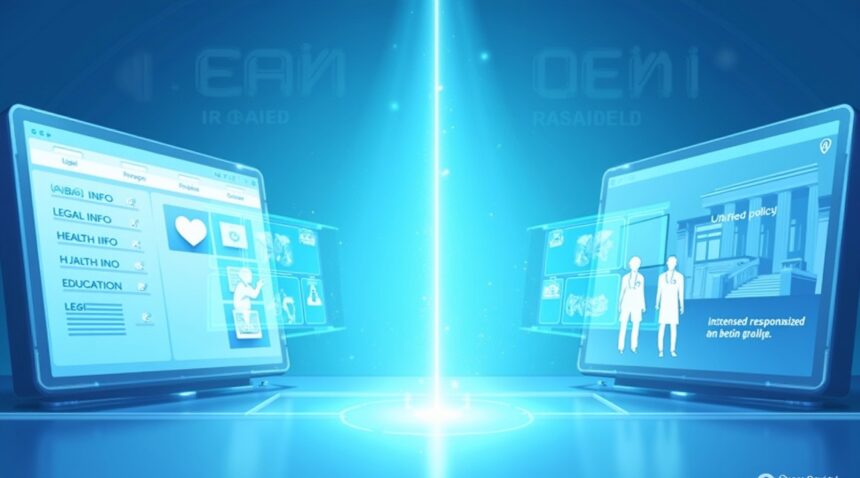OpenAI’s recent policy update clarifies long-standing restrictions rather than introducing new hurdles, reaffirming ChatGPT’s role in offering general insights on health and legal topics while disallowing personalized professional advice without proper oversight.
Key Takeaways
- The update clarifies rather than adds rules: ChatGPT can still discuss general legal and health-related topics, but it cannot offer specific guidance without the involvement of a licensed professional.
- Support from professionals: Legal and medical experts viewed the changes as a responsible move to mitigate risks such as unauthorized practice and to avoid user confusion caused by the AI’s authoritative tone.
- Proactive legal strategy: OpenAI introduced these consolidated guidelines not only to streamline understanding but also to help reduce liability and prepare for evolving AI regulations. This comes in response to lawsuits and formal concerns voiced by 44 state attorneys general.
- Teen safety enhancements: Alongside the policy update, OpenAI introduced new safety standards for minors, including age-based filtering, planned age verification, and increased content controls. These measures follow several tragic incidents involving teens and AI interactions.
- Varied public responses: While many experts and AI safety advocates praised the updates as essential to ethical development, some users expressed discontent, searching for alternative tools or using advanced prompts to bypass the new limitations.
For a full breakdown of these changes, readers can review OpenAI’s official announcement.
ChatGPT’s Updated Policy Clarifies Existing Rules Rather Than Creating New Restrictions
OpenAI made headlines recently by updating its Usage Policies on October 29, 2025, but the changes represent a clarification of existing rules rather than the introduction of new limitations. I’ve observed widespread confusion about these policy updates, particularly regarding how they affect the AI’s ability to discuss health and legal topics.
The company consolidated three separate policy documents into a single unified set of rules that applies across all OpenAI products. This streamlined approach covers ChatGPT, labs.openai.com, and the OpenAI API under one comprehensive policy framework. Instead of creating additional restrictions, this consolidation makes existing guidelines clearer and more accessible to users.
The updated policy specifically states that users cannot employ OpenAI services for providing customized advice that requires a license, such as legal or medical guidance, unless a licensed professional is appropriately involved in the process. Karan Singhal, OpenAI’s Head of Health AI, emphasized that this doesn’t represent a fundamental shift in the platform’s capabilities or restrictions.
Understanding the Distinction Between Information and Advice
The policy creates a clear distinction between general information sharing and personalized professional advice. ChatGPT continues to serve as a valuable resource for understanding legal and health information in broad terms. Users can still access educational content and general explanations about these topics without restriction.
However, the AI cannot provide specific, personalized professional advice without proper licensed professional oversight. This boundary has always existed, but the new policy makes it more explicit. ChatGPT has never been designed to replace professional medical or legal counsel, and this update reinforces that position.
The distinction matters because it allows the AI to maintain its educational value while preventing potentially harmful misuse. Users can still:
- Learn about legal concepts
- Understand health conditions in general terms
- Access factual information about these fields
The restriction applies only when someone seeks specific professional guidance that would typically require a licensed expert.
Despite viral media headlines suggesting dramatic changes to ChatGPT’s functionality, OpenAI clarified that these policies reflect existing guidelines rather than new restrictions. The company’s approach to artificial intelligence development continues to prioritize responsible use while maintaining educational accessibility.
This policy update arrives during a period of intense scrutiny around AI capabilities and limitations. As competitors like Google Bard gain popularity, OpenAI faces pressure to balance innovation with responsibility. The clarification serves to protect both users and the company from potential legal liability while maintaining the AI’s educational utility.
The consolidated policy approach also reflects OpenAI’s maturation as a company. By unifying previously scattered guidelines, they’ve created a more coherent framework that users can easily understand and follow. This transparency helps set appropriate expectations about what ChatGPT can and cannot do in professional contexts.
For users, this means ChatGPT remains a powerful tool for learning and understanding complex topics. The AI can:
- Explain legal procedures
- Describe medical conditions
- Provide general guidance on professional matters
It simply cannot offer the specific, personalized advice that licensed professionals provide through their training and expertise.
The policy update demonstrates OpenAI’s commitment to responsible AI development without unnecessarily limiting the technology’s educational potential. Users can continue leveraging ChatGPT for research, learning, and general information gathering while understanding the appropriate boundaries for professional advice.
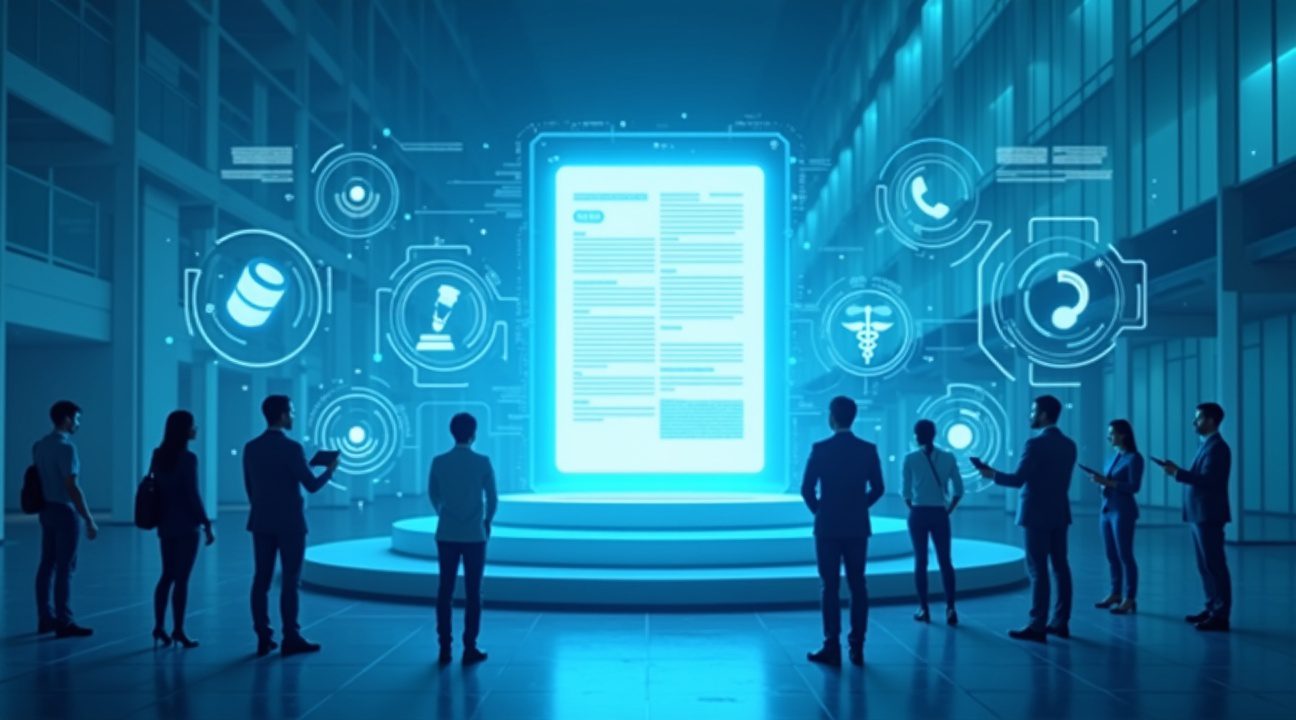
Professional Communities Welcome Liability Protection and Accountability Measures
Legal professionals viewed the clarification as necessary rather than revolutionary, noting concerns that ChatGPT’s confident tone could blur lines between educational content and professional counsel. The AI’s authoritative presentation style made it difficult for users to distinguish between general information and specific legal guidance, creating potential risks for both practitioners and the public.
Bar associations underscored the need for licensed oversight in legal matters to avoid unauthorized practice and uphold professional standards. Artificial intelligence tools can’t replace the nuanced judgment that licensed attorneys bring to complex legal situations. These organizations emphasized that while AI can support legal work, it shouldn’t operate without proper supervision from qualified professionals.
Healthcare Industry Addresses Safety Concerns
The healthcare industry responded similarly, emphasizing that the policy addresses concerns about liability and patient safety as AI tools become more integrated into health research and information systems. Medical professionals had grown increasingly worried about patients making healthcare decisions based on AI-generated advice without consulting licensed practitioners.
Some documented cases illustrate risks when individuals act on incorrect medical advice or delay seeing a professional, which can lead to severe consequences. These situations highlighted the gap between AI’s information processing capabilities and the clinical judgment required for proper medical care. Patients who relied solely on AI guidance sometimes postponed necessary treatments or pursued inappropriate remedies.
Mental health represents a particularly sensitive area, as current AI technologies aren’t equipped to manage crisis interventions or provide therapeutic services. The complexity of psychological conditions requires human empathy, professional training, and the ability to recognize emergency situations that AI simply can’t provide. Crisis situations demand immediate professional intervention that goes beyond what any automated system can deliver.
Continued Professional Value with Proper Oversight
Despite these concerns, ChatGPT continues to offer value to licensed professionals in legal and medical fields for tasks such as drafting, research, and support—provided that licensed oversight is ensured. Legal professionals can use AI to help draft documents, conduct preliminary research, or organize case materials. Similarly, healthcare workers can leverage AI for administrative tasks, literature reviews, and information compilation.
The key difference lies in maintaining professional responsibility and judgment throughout the process. Licensed practitioners can evaluate AI-generated content, verify its accuracy, and apply their expertise to ensure appropriate application. This approach allows professionals to benefit from AI efficiency while maintaining the standards their licenses require.
Professional groups, including bar associations, affirmed the policy’s alignment with maintaining licensed responsibility. They recognized that clear boundaries help protect both practitioners and the public while preserving the integrity of their respective professions. The policy change doesn’t eliminate AI’s usefulness but establishes appropriate guardrails for its application.
I see this development as particularly important given the rapid adoption of AI tools across professional settings. The healthcare and legal communities understand that competing AI platforms will likely face similar scrutiny and policy adjustments. Early establishment of clear boundaries helps prevent more serious incidents that could damage public trust in both AI technology and professional services.
The policy shift also reflects a maturing understanding of AI’s capabilities and limitations. Rather than viewing AI as a replacement for professional expertise, these industries now frame it as a tool that enhances human judgment when used appropriately. This perspective allows for continued innovation while maintaining the safety nets that protect public welfare and professional standards.
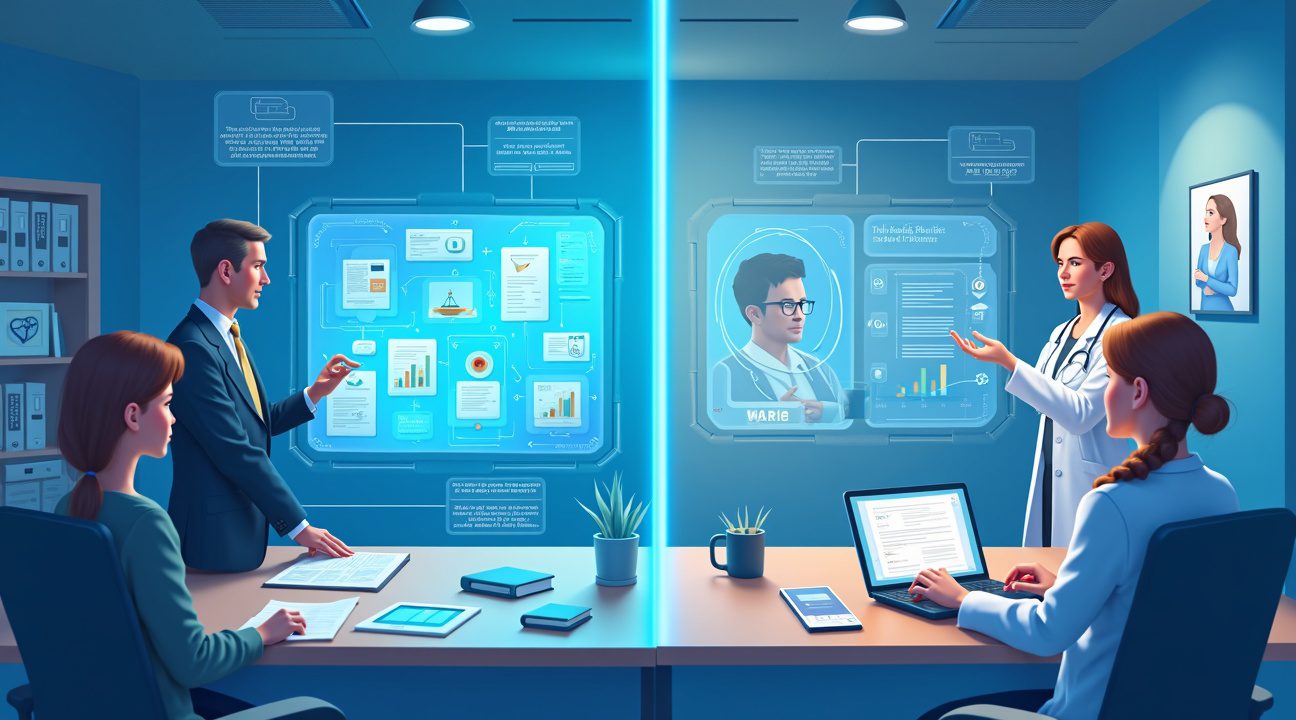
OpenAI Addresses Legal Exposure and Regulatory Pressure Through Proactive Policy Changes
OpenAI’s recent policy revision represents a calculated move to shield itself from mounting legal vulnerabilities. The company’s decision to prohibit ChatGPT from dispensing health and legal advice stems directly from concerns about users who might act on AI-generated professional advice without proper oversight. When individuals follow medical or legal recommendations from an AI system, serious consequences can emerge, creating a tangled web of responsibility that could ultimately implicate OpenAI.
The updated usage terms establish clear boundaries around high-risk professional guidance. ChatGPT can no longer provide specific medical diagnoses or legal strategies without emphasizing the need for licensed practitioner involvement. This strategic shift helps insulate OpenAI from potential lawsuits where plaintiffs might argue the company bears responsibility for harmful outcomes resulting from its AI’s recommendations.
Anticipating Regulatory Frameworks
These policy changes also position OpenAI ahead of likely government intervention. National regulatory bodies are increasingly scrutinizing how AI tools operate in professional contexts, particularly where public safety is concerned. By implementing self-imposed restrictions now, OpenAI demonstrates proactive compliance with standards that may soon become mandatory.
The company’s approach mirrors strategies seen in other tech sectors where AI competitors face similar pressures. Rather than waiting for external mandates, OpenAI has chosen to establish internal guardrails that align with probable future regulations. This forward-thinking strategy could prove advantageous if and when formal oversight frameworks emerge.
Legal and medical responsibility now rests squarely with qualified professionals rather than with OpenAI or ChatGPT. This distinction creates a protective buffer that clarifies where accountability begins and ends. Users seeking professional advice must understand that AI-generated responses serve only as preliminary information, not as substitute expertise.
The revised terms eliminate much of the ambiguity that previously surrounded ChatGPT’s capabilities in professional contexts. Previously, users might have interpreted the AI’s responses as authoritative guidance, potentially leading to misplaced trust in automated recommendations. Clear restrictions now prevent such misunderstandings from developing.
This risk mitigation strategy extends beyond immediate legal concerns. OpenAI recognizes that AI systems operating in sensitive domains face heightened scrutiny from multiple stakeholders, including professional associations, insurance companies, and regulatory agencies. By drawing firm boundaries around professional advice, the company reduces its exposure across these various risk vectors.
The policy revision also reflects broader industry trends where AI companies are reassessing their liability exposure. Tech giants developing AI tools increasingly recognize that unrestricted AI capabilities in professional domains create unsustainable legal risks. OpenAI’s proactive stance may influence how other companies approach similar challenges.
These changes don’t necessarily limit ChatGPT’s utility for users seeking general information about health or legal topics. The AI can still provide educational content, explain basic concepts, and offer general guidance while emphasizing the need for professional consultation. This balanced approach maintains user value while reducing OpenAI’s liability exposure.
The timing of these policy updates suggests OpenAI is positioning itself strategically before potential high-profile incidents that could damage the company’s reputation or trigger regulatory crackdowns. By establishing clear limitations now, OpenAI demonstrates responsible AI development practices that could influence public perception and regulatory attitudes.
This regulatory anticipation strategy represents a sophisticated understanding of how AI governance will likely evolve. Rather than reacting to external pressures after they emerge, OpenAI has chosen to shape its own operational boundaries in ways that align with probable future requirements. This approach could provide competitive advantages as the AI industry matures and faces increasing oversight.
Comprehensive Teen Safety Measures Follow Lawsuit and Regulatory Warnings
I’ve witnessed a significant shift in AI safety protocols as OpenAI responds to mounting concerns about teen safety online. The company announced comprehensive measures following a lawsuit connected to a teenager’s death after interacting with an AI chatbot, highlighting the urgent need for stronger protections.
New Age-Specific Restrictions Transform AI Interactions
ChatGPT now operates under strict age-based limitations that fundamentally change how minors can interact with the platform. The system blocks flirtatious conversations, filters graphic content, and actively avoids discussions about self-harm. These changes represent a dramatic departure from previous policies where artificial intelligence platforms operated with minimal content restrictions.
Character.AI took even more aggressive action, reducing chat time for users under 18 to zero by November 25. This complete restriction demonstrates how seriously companies are treating potential risks to vulnerable young users. ChatGPT’s approach differs by maintaining access while implementing careful monitoring for mental health warning signs.
The AI now refuses to engage with users from vulnerable groups, including those experiencing psychosis, mania, or suicidal thoughts. Additionally, the system identifies and restricts interactions when users develop excessive emotional attachments to the AI, preventing unhealthy dependencies that could prove harmful.
Verification Systems and Content Tiers Address Safety Concerns
OpenAI plans to implement in-house age verification systems while partnering with third-party providers to prevent minors from circumventing safety controls. These measures aim to create foolproof barriers that protect young users while maintaining legitimate access for adults.
Sam Altman announced that verified adults will gain access to erotic content starting in December, establishing clear content tiers based on age verification. This dual approach allows the platform to serve adult users’ needs while maintaining strict safety standards for minors.
The timing of these announcements coincides with increased regulatory pressure and growing concerns about AI safety. Legal challenges and tragic incidents have forced companies to reassess their responsibility for user welfare, particularly among impressionable teenagers.
These changes reflect a broader industry recognition that AI platforms must balance innovation with protection. The measures represent the most comprehensive teen safety initiative I’ve seen from a major AI company, setting new standards for how the industry handles vulnerable users.
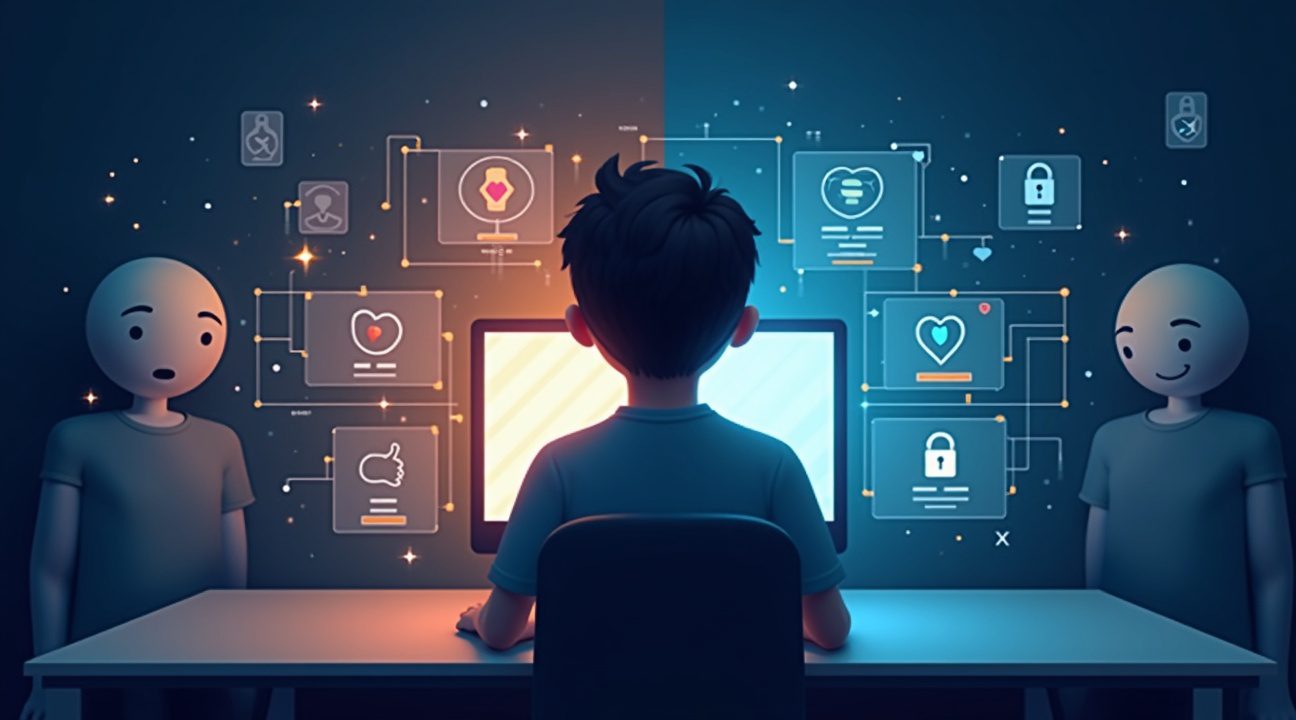
Legal Pressure from Multiple Sources Drives Industry-Wide Policy Changes
The AI industry faced unprecedented legal challenges when both Character.AI and OpenAI encountered lawsuits from families whose children died by suicide after interacting with AI chatbots. These tragic cases became turning points that sparked widespread regulatory action and forced companies to reconsider their safety protocols.
Legislative Response and State-Level Action
California responded decisively by enacting comprehensive legislation that banned exposing minors to sexual content through AI systems. This new law also mandated that AI platforms implement robust support mechanisms specifically designed for users experiencing suicidal thoughts or psychological vulnerability. The legislation established clear boundaries that companies couldn’t ignore without facing serious legal consequences.
In August, the pressure intensified when 44 state attorneys general collectively issued warnings to major AI companies including xAI, Meta, and OpenAI. Their joint statement demanded stricter restrictions on sexually explicit material presented to minors and highlighted the urgent need for enhanced safety measures. This coordinated effort from nearly all U.S. states sent an unmistakable message that regulatory oversight would continue expanding.
Industry-Wide Transformation Under Legal Scrutiny
The combined impact of wrongful death lawsuits, new state regulations, and coordinated governmental pressure created a legal environment that demanded immediate changes. Companies could no longer operate under the assumption that existing content moderation would suffice for protecting vulnerable users, especially young people.
Between August and October 2025, this escalating legal pressure resulted in significant policy adaptations across the entire AI sector. The lawsuits served as powerful catalysts, but the sustained governmental intervention made it clear that voluntary safety measures wouldn’t satisfy regulatory demands. Companies began implementing more stringent content filters and developing specialized support systems for at-risk users.
This legal climate fundamentally changed how artificial intelligence companies approach user safety. The threat of additional litigation, combined with active state-level legislation and federal oversight, created conditions where proactive policy changes became essential for business survival. What started as isolated tragedies evolved into industry-wide transformation, with companies racing to implement safety measures that would protect both users and their own legal interests.
Mixed Public Response Highlights Tension Between AI Innovation and Professional Standards
The announcement drew sharply contrasting reactions across different user groups, revealing underlying tensions about AI’s proper role in professional domains. Legal and healthcare professionals largely welcomed the policy changes as validation of their expertise and ethical responsibilities. These practitioners viewed OpenAI’s decision not as an obstacle to progress but as recognition that certain types of guidance require human judgment and professional accountability.
AI ethics advocates echoed this support, praising the update as a demonstration of responsible AI development. They highlighted how OpenAI’s proactive approach to limiting potentially harmful outputs represents meaningful progress in AI safety standards. This response underscored growing expectations that artificial intelligence companies should prioritize user welfare over unrestricted functionality.
User Adaptation and Workaround Attempts
Conversely, many users expressed frustration with the new limitations. Those who had grown accustomed to receiving quick, informal guidance from ChatGPT found themselves suddenly cut off from a resource they’d come to rely on. This disappointment led some users to explore creative solutions, including:
- Testing alternative AI platforms with less restrictive policies
- Developing prompt-engineering techniques to circumvent the new rules
- Seeking workarounds through rephrased questions or hypothetical scenarios
- Moving discussions to less regulated AI tools
These adaptation efforts highlight the challenge AI companies face when implementing policy changes that restrict previously available features. Users often resist limitations, especially when they’ve integrated AI assistance into their daily routines.
Setting Industry Precedents
OpenAI’s decision carries broader implications for the competitive AI landscape. The policy clarifies that AI tools can complement professional services without replacing licensed expertise, establishing a collaborative framework where professionals maintain ultimate responsibility. This distinction helps define appropriate boundaries for AI assistance in sensitive domains.
The move demonstrates that major AI companies can implement protective measures voluntarily, potentially reducing the need for external regulation. By taking this step independently, OpenAI has created momentum for industry-wide self-regulation practices. Competitors like Google Bard and other AI platforms now face pressure to establish similar ethical guidelines, potentially creating new industry standards for responsible AI deployment.
This precedent suggests that balancing innovation with public trust requires ongoing policy evolution rather than static approaches.
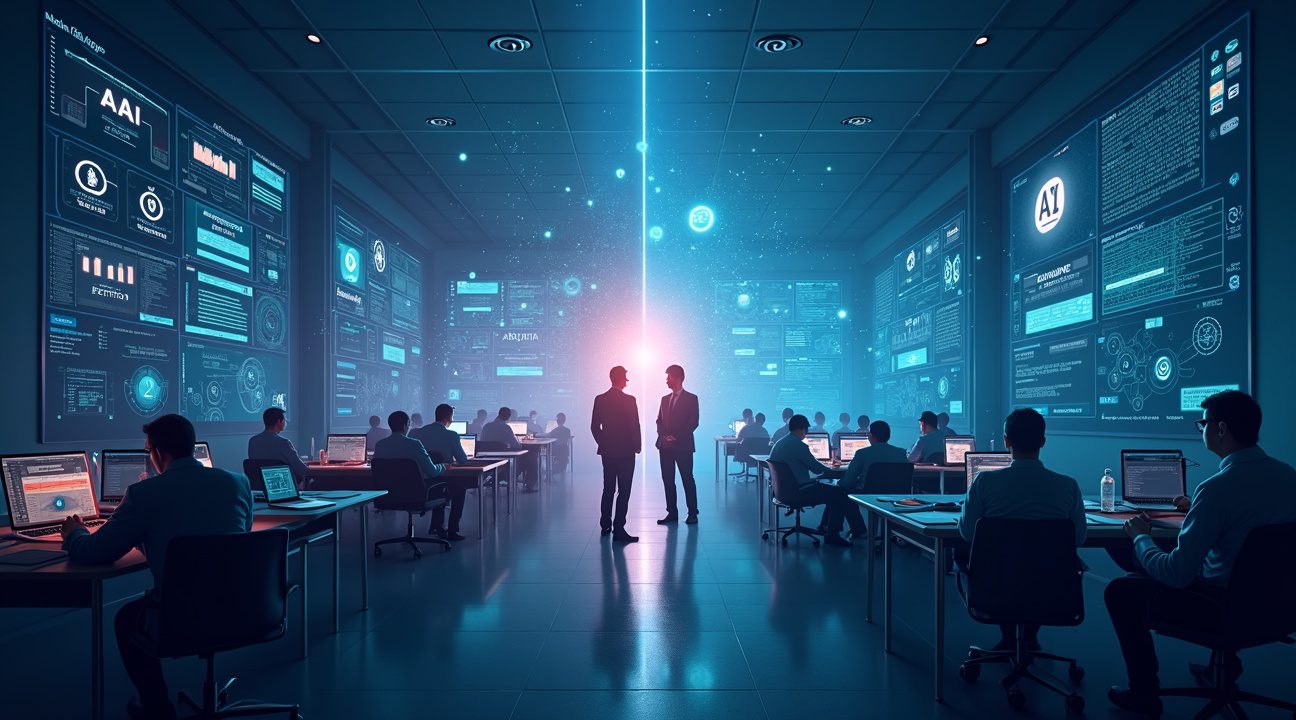
Sources:
TED Law Firm – OpenAI Bans ChatGPT’s Legal and Health Advice
DeepLearning.AI – Inside Character.AI and OpenAI’s Policy Changes to Protect Younger and Vulnerable Users
Colorado AI News – Brown’s Law: Did OpenAI Ban Legal Advice via ChatGPT? Not Exactly
Elephas – Deep Dive: OpenAI’s New Rules for Teen Safety on ChatGPT
Legal IT – OpenAI Changes ChatGPT’s Usage Policy to Preclude Legal Advice
Times of India – Explained: What Has Changed in OpenAI’s Policy on Health and Medical Information on ChatGPT
TechRound – Despite What You’ve Heard, ChatGPT Still Gives Medical and Legal Advice
Artificial Lawyer – OpenAI Stops Giving Legal Advice – But Has It Really?
Business Insider – ChatGPT Health Questions: OpenAI Policy Change
OpenAI – Strengthening ChatGPT Responses in Sensitive Conversations
OpenAI – Teen Safety, Freedom, and Privacy
OpenAI – Usage Policies

